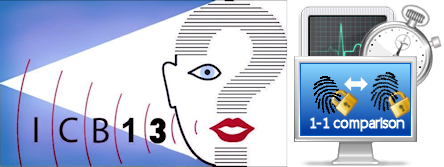STFV@ICB-2013
STFV@ICB-2013 is a
fingerprint verification competition for algorithms relying on protected templates based on the FVC-onGoing
STFV benchmark area, organized in conjunction with the
IAPR Sixth International Conference on Biometrics (ICB-2013).

Within the context of this competition, “protected template” is a fingerprint representation which cannot be reverse-engineered to extract the fingerprint features. Note that encrypting the template (with symmetric or asymmetric keys) is not sufficient to qualify an algorithm for this competition: only non-invertible feature transformations are allowed. The participant is required to reference a technical paper discussing the security of the technique. Note that the algorithm will be tested for accuracy and efficiency only; no security analysis will be performed, hence
STFV@ICB-2013 organizers do not certify in any way the template protection claims.
Motivation
In recent years, template protection techniques have gained increasing interest in the biometric community, due to the world-wide diffusion of new biometric applications and the consequent growing of privacy issues. Fingerprints are one of the most studied biometric traits and the most widely used in civil and forensic recognition systems, hence the development of effective techniques to protect fingerprint templates is undoubtedly a crucial challenge for the research community. Although several fingerprint template protection methods have been proposed in the literature, the problem is still unsolved, since enforcing non-reversibility tends to produce an excessive drop in accuracy. Furthermore, unlike fingerprint verification, whose performance is nowadays assessed with public benchmarks and protocols, performance of template protection approaches is often evaluated in heterogeneous scenarios, thus making it very difficult to compare existing techniques.
Benchmark
STFV@ICB-2013 is based on the following benchmarks:

|
STFV-STD-1.0 |
STFV-HARD-1.0 |
Contains fingerprint images acquired in operational conditions using high-quality optical scanners. Results should reflect the expected accuracy in large-scale fingerprint-based applications.
More details...... |
Contains a relevant number of difficult cases (noisy images, distorted impressions, etc.) that makes fingerprint verification more challenging. Results do not necessarily reflect the expected accuracy in real applications but allow to better discriminate the performance of various fingerprint recognition algorithms.
More details...... |
|
How to participate
All algorithms evaluated under the above benchmarks before the deadline specified below, will be included in STFV@ICB-2013.
Submission and evaluation of the algorithms follow the standard FVC-onGoing rules (see Sumbission and Publication policy).
Note that, in order to be included in STFV@ICB-2013,
evaluation results must be published by the participants before the deadline.
Deadline (expired)
Algorithms' results must be published on the FVC-onGoing website within March 25th, 2013.
Results
The table below reports the results of the competition
on the STFV-STD-1.0 benchmark (algorithms sorted by
EER).

The table below reports the results of the competition
on the STFV-HARD-1.0 benchmark (algorithms sorted by
EER).

Organizers
- R. Cappelli
- M. Ferrara
- D. Maltoni
|